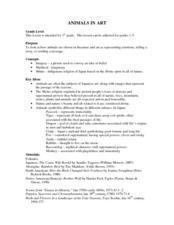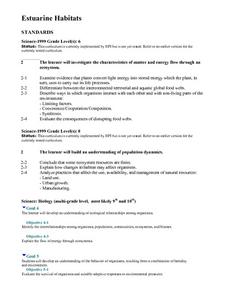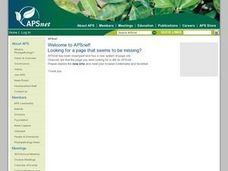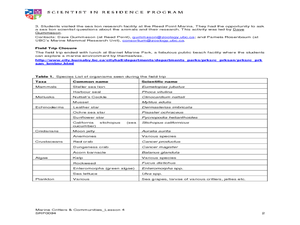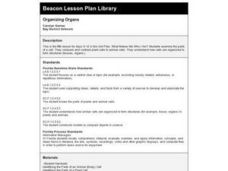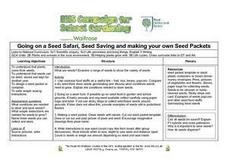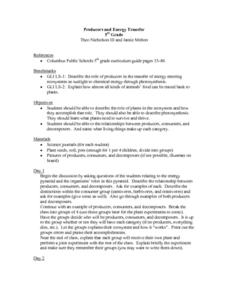Curated OER
What Animals Eat
First graders organize animals according to what they eat. They compare the teeth of plant eaters and meat eaters.
Curated OER
Animals in Art
Students look at how animals are shown in literature and art as representing emotions, telling a story, or sending a message in this elementary school Language Arts and Visual Arts lesson.
Curated OER
Estuarine Habitats
Sixth graders study the important habitats, flora, fauna, and physical factors of coastal habitats. They compare the aquatic habitats to terrestrial habitats by researching and completing tables with the information.
Curated OER
Animal Diversity
Young scholars explore biology by completing science worksheets in class. In this animal anatomy lesson, students read the book The Adventures of Marco and Polo and identify the animals mentioned in it. Young scholars examine a real life...
Curated OER
The Great Kapok Tree: A Social Studies Lesson
Students examine how plants, animals and people need each other in order to survive. They simulate an ecosystem in a food web and role play certain animals or plants. They answer questions about their simulation to finish the lesson plan.
Curated OER
Animal Masks
Learners design and make animal masks. In this research and application lesson, students use a computer to research what a panther eats, select an animal mask they want to make and then use the materials provided to create their...
Curated OER
Animal and People Habitats
Students examine how animals create a unique space in which they can live. Students read a poem about animals' habitats discuss the habitats. They draw a space of their own and write a poem that describes their habitat.
Curated OER
Biology Quiz
In this biology worksheet, students complete short answer questions about botany, animals, plants, DNA, and more. Students complete 15 short answer questions.
Curated OER
The Ice Age
Students study the ice age and the causes of it. In this Ice Age lesson plan students examine why those animals became extinct and complete activity sheets.
Curated OER
Snug in the Snow
Young scholars explore how snow helps animals survive in the wild. In this animal science lesson, students review key vocabulary words and discuss types of animal adaptations. Young scholars construct shoebox to simulate the snowy...
Curated OER
What Parts Are There to a Plant?
Learners explore botany by completing plant science worksheets. In this plant anatomy lesson, students examine real vegetables in class using magnifying glasses. Learners identify the plants anatomy and complete worksheets discussing...
Curated OER
Plant Parts and Their Diseases
Students see how certain plants are very important to us. They explain that healthy plants are important to keep people healthy. They study the major parts of a plant (root, stems, leaves, flowers, fruit and seeds) and their basic...
Curated OER
Marine Critters and Communities
Students touch, see, smell, and hear marine animals that live in a marina. In this marine animals lesson plan, students take field trip to a marine environment after studying the animals.
Curated OER
Organizing Organs
Fifth graders research plant and animals cells and create a Venn Diagram to show the similarities and differences.
Curated OER
Kindergarten Children
In this picture labeling worksheet, students label the pictures as either animals, plants, food, furniture, or toys. Students label 30 pictures total.
Curated OER
Where Do Your Veggies Grow?
First graders investigate the origins of vegetables. In this Science lesson, 1st graders identify where fruits and vegetables come from. Students describe how people utilize plants.
Curated OER
Dna in the Garden - Where It All Began
In this DNA instructional activity, learners read about Gregor Mendel and his experiments with plants and DNA. Students complete a crossword puzzle using 10 vocabulary words from the selection.
Alabama Learning Exchange
Botany Scavenger Hunt Where's the Ginkgo?
Learners use a science journal to log plants that are native to Alabama. In this plant lesson plan, learners identify characteristics, describe environments, and classify the plants that they find.
Curated OER
Going on a Seed Safari
Students describe biology by identifying different plants in class. In this seed lesson, students discuss the process of how a plant grows from seed to leaves. Students attend a field trip to their garden or another park and collect a...
Curated OER
Producers and Energy Transfer
Fifth graders discuss the relationship between producers, consumers, and decomposers as they look at the energy pyramid. While working in small groups, they create an ecosystem that includes all or some of the given categories, and they...
Curated OER
Parts of a Plant
Students explore biology by listening to an in-class lecture. For this plant science lesson, students sing songs with their classmates regarding anatomical parts of a plant and create plants from arts and crafts materials. Students...
Curated OER
Farm Products Help Me Grow
Students view a display of empty food containers (or illustrations). They select a food and decide as a class if it has an animal or plant origin. Students view a display of common farm animals that are commonly eaten (cow, pig, chicken,...
Curated OER
Biodiversity Memory Match Up
Students are introduced to the animals of Asia. In this biodiversity lesson, students use interactive maps to identify animals from Asia, then play a memory game to reinforce the information.
Curated OER
Stormy Weather
Fifth graders demonstrate their knowledge for how animals survive in natural environments when a storm occurs. For this science/writing lesson, 5th graders engage in a listening activity with the teacher. Additionally, students write a...
Other popular searches
- Arctic Plants and Animals
- Aquatic Plants and Animals
- Coastal Plants and Animals
- Artic Plants and Animals
- Plants and Animals Needs
- Animals and Plants
- Plants and Animals Interact
- Desert Plants and Animals
- Plants and Animals Die
- Attic Plants and Animals
- Comparing Plants and Animals
- Animals Plants and Water



